Judge in void case insists on putting another Negro caught traveling on trial
Simpson, jailed 2 days for using public road, defies court, citing unprecedented defense that ‘driving a motor vehicle is a privilege’ under UAPA, exhaustion of administrative remedies

SAVANNAH, Tenn., Tuesday, Oct. 28, 2025 — Tennessee general sessions judge Daniel L. Smith is irritated with a mild-mannered woman, Brenda Simpson, 76, who has caught the white legal political establishment in Hardin County off guard with an unprecedented challenge to so-called traffic stops.
At “Mother Brenda’s” arraignment today on three criminal charges brought under the motor vehicle law at title 55, the judge insists that she stand by so he arrange another hearing to determine probable cause in a case where she’d been jailed two days without probable cause. She’d been arrested without a warrant Aug. 25 in Savannah, in breach of T.C.A. § 40-7-103 regarding officer arrest without warrant, in using an automobile on a public street.
“He listened, then he said, ‘Yeah, all right,” flipping me off,” says Mrs. Simpson, a healthy eating promoter who lives in Savannah. “And I told him that the court lacked subject matter jurisdiction and I demand to be brought before the proper authority to be heard, that my right to due process cannot be violated, and that the state had failed to exhaust its administrative remedies [and that the officer had a duty to] refer me to the department of safety. He said, ‘OK, I’m going to be putting in a plea for you, a plea of not guilty.’ But I said, ‘The court doesn’t have subject matter jurisdiction.’ He flipped me off, like, ‘You’re saying these things but it don’t mean nothing.’ That kind of attitude.”
Mrs. Simpson is in court on two criminal citations and three charges: Suspended driver license, no insurance, no registration of her car as a motor vehicle. She is accused of “driving,” an act that Tennessee courts don’t define according to the law but the essential elements of which include commerce. A state trooper is authorized to determine proofs and evidences such eyewitness testimony of cargo or passengers, or seizure or review of bills of lading, contracts or passenger lists (a passenger is a paying guest or rider in case law) indicating privilege taxable activity.
Cop Ethan Lusk imposes trucker law on ‘traveler’
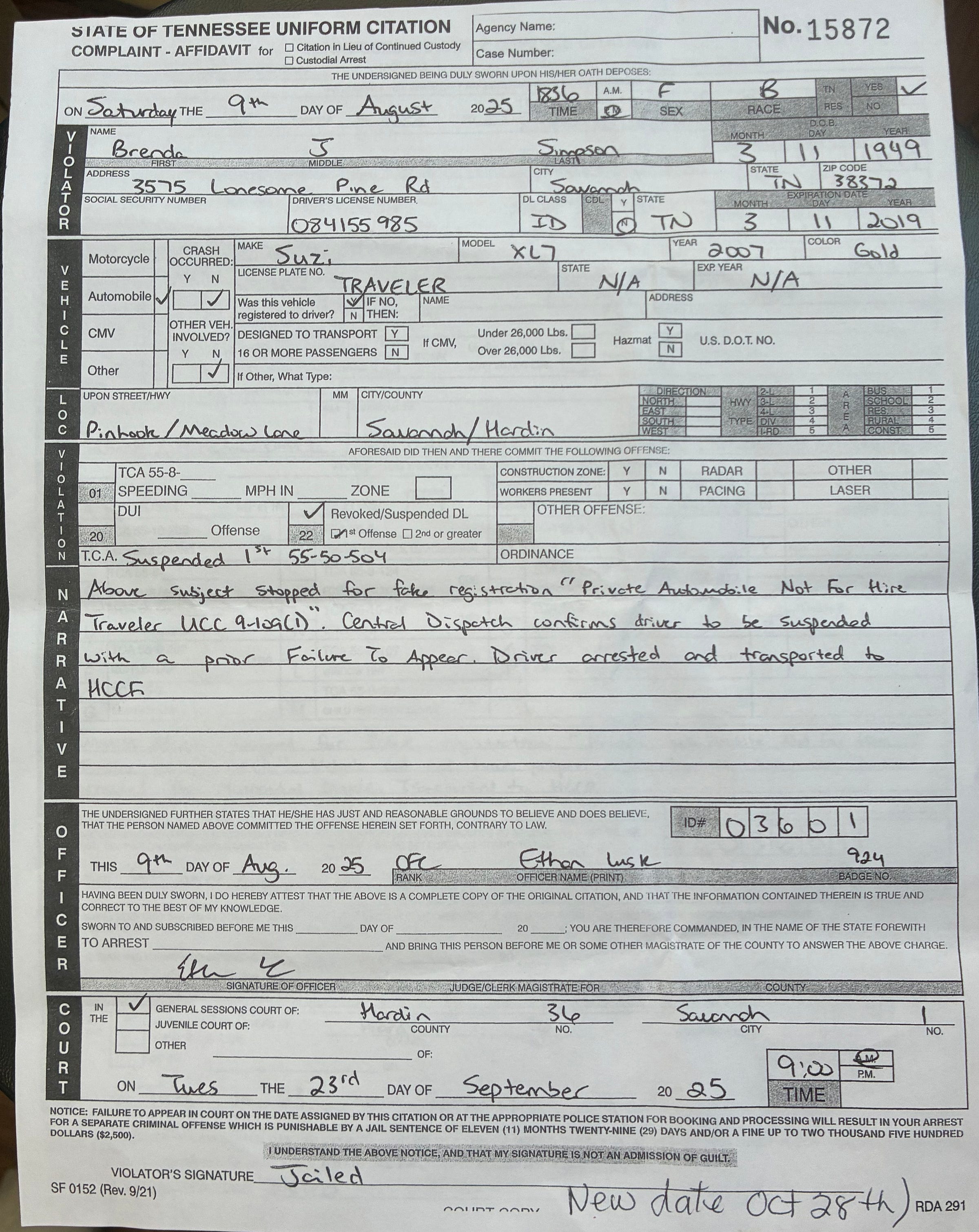
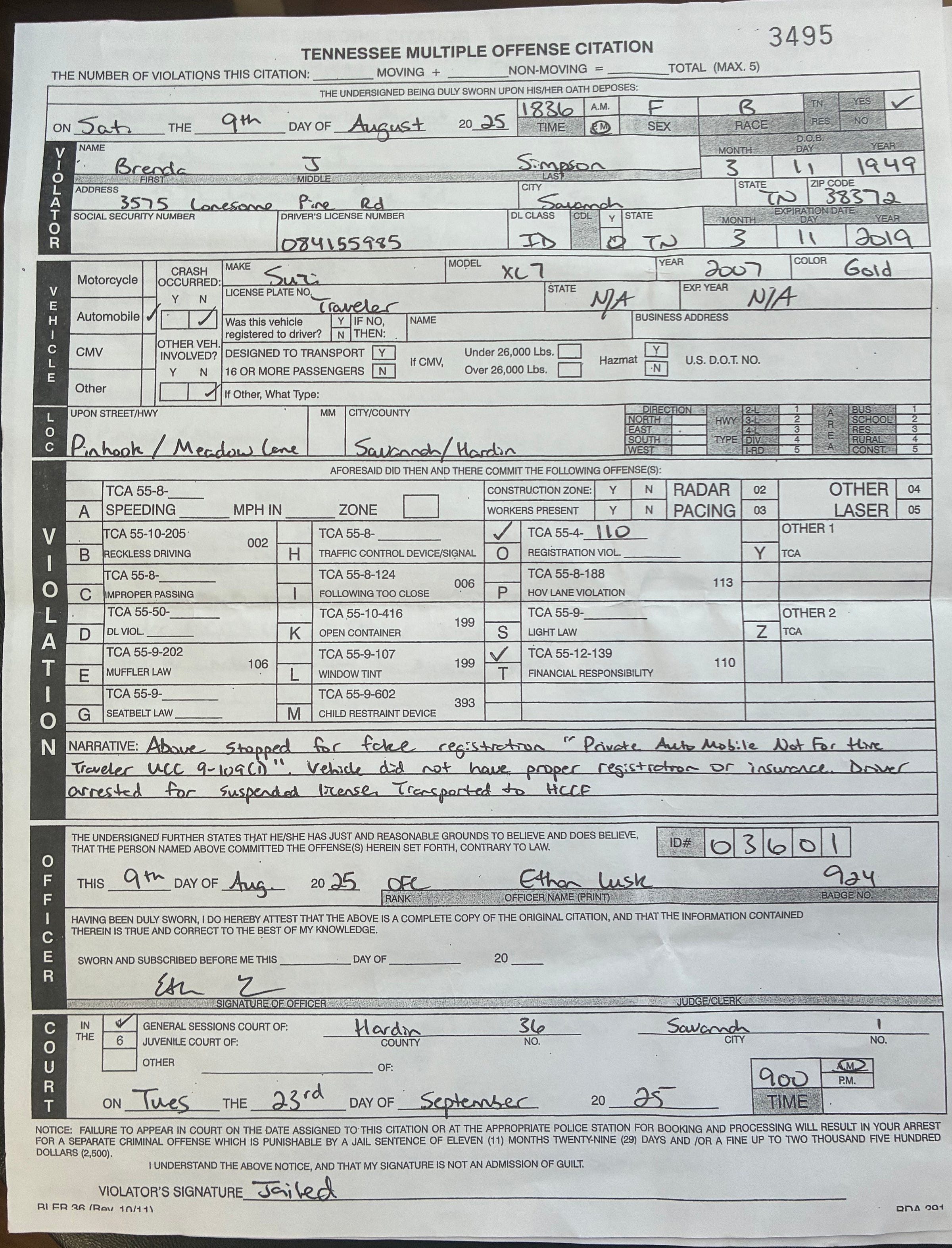
“Well, the way it is, they doing a continuance ‘til next Tuesday because the officer is not there to deal with it,” said court witness Paul Williams. “In other words, they entered a plea of not guilty at the arraignment today and they’re going to the probable cause determination next Tuesday. The subject matter jurisdiction and all that, they overlooked it. It didn’t mean nothing to ’em. According to their statutes, that’s what they’re following.”
The assistant district attorney, Mrs. Simpson indicates, made some sort of defense of the court’s subject matter jurisdiction, but she can’t recall a lick of what the man said. The next hearing will be a probable cause, the ADA tells her, according to Mrs. Simpson.
Asked if the judge and district attorney Neil Thompson are following their statutes, Mr. Williams says, “No, they’re not following their statutes. Because subject matter jurisdiction can be challenged at any time, even on appeal. The court is denying the subject matter,” says the West Tennessee bureau chief for Eagle Radio Network based in Chattanooga.
State of Tennessee, through its agents, is moving against Mrs. Simpson on three allegations – driving on suspended license, lack of registration and failure to be an insurance customer under the Tennessee financial responsibility law of 1977. The allegations arise from a reading of the motor and other vehicle law regulating the privilege of driving and operating a motor vehicle.
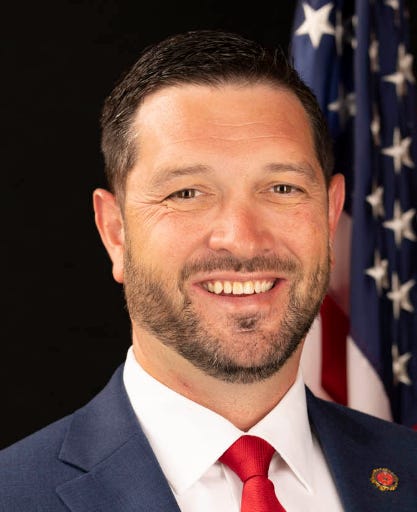
Privilege allegations are noncriminal
Driving and operating a motor vehicle, Mrs. Simpson argues, constitute a privilege. That means that allegations under the license, in chapter 50 of that law administered by the department of safety, are heard by the commissioner of safety. The allegations are filed by state into the commissioner’s department, according to the law, and the commissioner is authorized to hold an administrative trial called a contested case.
Mr. Williams wonders if Mrs. Simpson should perhaps subpoena Jeff Long, the safety commissioner. This thought lies in a deadzone. The safety commissioner hasn’t heard the first traffic case in the history of the department, formed in 1937. It offloads its responsibilities to localities that have no lawful authority to hear privilege administration cases.
But cities and counties use criminal police power to pretendedly “administer” the administrative relationship between the department and every licensee in the state, of which there are 5.8 million.
In using criminal enforcement powers upon the public there has arisen a public scourge of the criminal traffic stop getting sensational coverage on YouTube and TikTok. Local government officers in Hamilton, Hardin and other counties operate as flesh-eating fish swarming crime-free members of the public as if they were criminals, shooting, tasing, dragging them, jailing them and prosecuting them as they might thugs, drug gang murderers, rapists, robbers and disorderly drunkards.
What is subject matter jurisdiction?
Mrs. Simpson has done a good deal of thinking and reading about law and her God-given rights. But she is not experienced in court and as a “pro se” accused, is liable to make mistakes. But none can be fatal, given the case is a legal void.
“The concept of subject matter jurisdiction involves a court’s power to adjudicate a particular type of controversy,” says an important Tennessee case. “Courts derive their subject matter jurisdiction from the Constitution of Tennessee or from legislative act ***, and cannot exercise jurisdictional powers that have not been conferred directly on them expressly or by necessary implication. ***
“A court’s subject matter jurisdiction in a particular circumstance depends on the nature of the cause of action and the relief sought. *** It does not depend on the conduct or agreement of the parties *** , and thus the parties cannot confer subject matter jurisdiction on a trial or an appellate court by appearance, plea, consent, silence, or waiver. *** Judgments or orders entered by courts without subject matter jurisdiction are void *** . The lack of subject matter jurisdiction is so fundamental that it requires dismissal whenever it is raised and demonstrated.” Dishmon v. Shelby State Cmty. Coll., 15 S.W.3d 477, 480–81 (Tenn. Ct. App. 1999) (internal citations omitted)
Law indicates mistakes she makes are effectively cleansed by the overriding doctrine of subject matter jurisdiction and its lack, as explained in Mrs. Simpson’s filing Monday of a pre-plea remedy & avoidance and a supporting request for mandatory judicial notice of the law.
Objection made
Mrs. Simpson says she objected to the judge’s entry of a not guilty plea.
“And at the very end of it she said ‘I’m objecting to this hearing.’” said Mr. Williams’ wife, Pam, who were witnesses today.

“She said she wanted a ruling on this. He said, ‘Naww, we’re going to trial. And when we get to trial, I’ve give ya all the rulings.’”
“The bottom line is,” Mr. Williams says, “she had to sign saying she would come back next week. She signed it under duress, and then they let her leave.”
Mrs. Simpson inked her ideas on white index cards. “The state has failed to exhaust its administrative remedies by referring me here instead of to the department of safety pursuant to the UAPA. Yeah, I did say that. And ‘I demand to be brought before the proper authority to be heard that my right to due process is not violated.’ That’s what I said to him.”

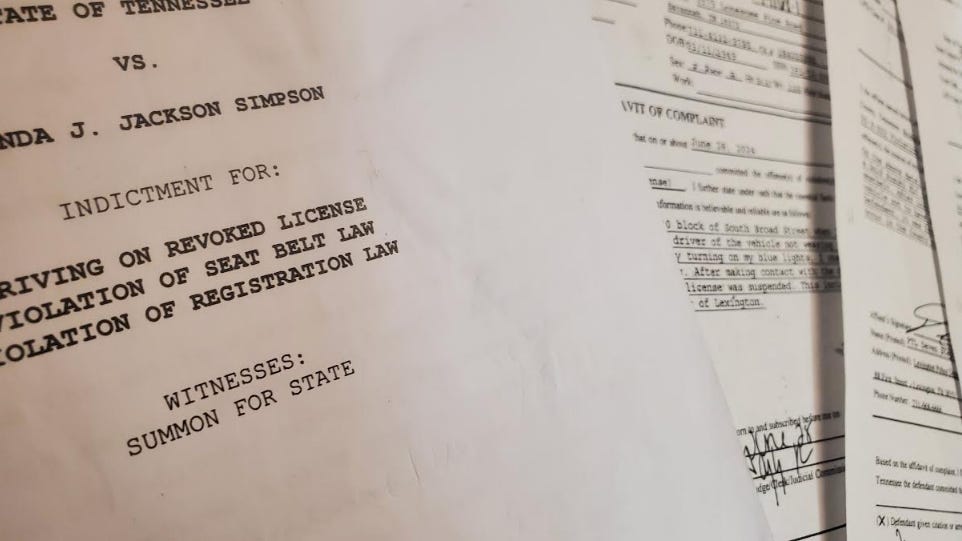
The fighting and mercy reporter at GiveSendGo
David runs a personal nonprofit fighting and mercy ministry. He thanks you for checks sent directly to c/o 10520 Brickhill Lane, Soddy-Daisy, TN 37379. Also at GiveSendGo at the link above.


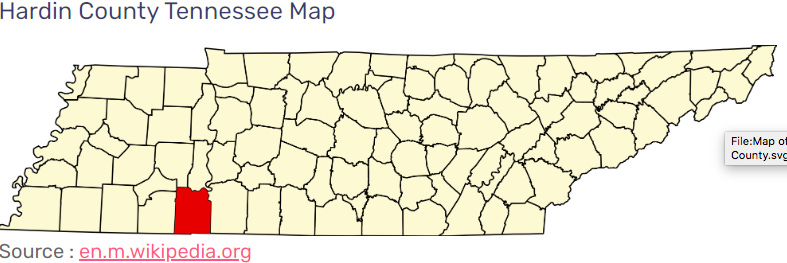
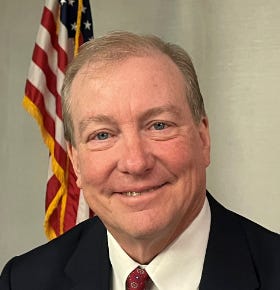
In order for the outcome of gaining liberty for ALL drivers during traffic stops, I'm simply asking this question to which I humbly don't know the answer....Being the fact that this is a Black lady, would it be strategic (or not) to play the race card like the Radical Left always does? In other words, is the judicial system in Hardin County Racist as an outward media campaign to make it more likely the judge would rule in favor of you, David? In essence, I'm asking would it benefit the hoped for outcome of the case for the media to be used as a way to pressure the judicial system of Hardin County, TN?
As we all know, this tactic has worked for Leftists Activists over the years so the only objection to this might be an ethical and pride matter on our side on whether we "stoop" to those ethical standards. A deeper question is, should ethical and moral standards be more important to us than restoring liberty?
Again, this may totally have the opposite effect and anger the judge and whole system, right? I'm simply wondering if there's a there there!
her case is somewhat similar to mine. Big difference is I have a video of the idiots pulling me out of my car before any charges were made and no citations were issued, nor were there exceptions to the REQUIREMENT to issue a citation listed anywhere. The sad fact is that "law enforcement" doesn't care what the law says or is, only what they can force through their kangaroo courts.
In my case, after I provided my ID an idiot Lt. came up and barked "name and date of birth or go to jail" three times, the first time I was shocked and just kinda repeated it softly with a chuckle, the second time he interrupted my answer by repeating the unlawful command, and the third time he interrupted my answer with a "take him to jail" command and I was forcefully removed with no charges being made, no mention that I was being arrested, no opportunity to exit the car on my own. The clowns just attacked, and I have it on HD video from a stationary camera.
No citations were written in my case, which is a REQUIREMENT. The video I have, and their body cam footage I will soon get in discovery, prove my case. Though not on my video, After I was pulled out of my car I asked the idiot Lt. what I was being arrested for and he literally said I was being arrested "for resisting arrest", I laughed at him and said under what authority and he said "the tenth amendment, all power to the states". I can't wait to get that moron in a deposition.
This is from my motion to dismiss the rubber stamp "indictment". Perhaps it might be helpful to this woman if she reads this,
GROUND ONE — STATUTORY REQUIREMENT FOR CITATION, NOT ARREST
1. T.C.A. § 40-7-118(b)(1) requires that for most misdemeanors—including all Title 55 traffic matters—an officer shall issue a citation in lieu of arrest unless one of the narrow exceptions in subsection (c) applies.
2. Tennessee courts hold this duty to be mandatory, not discretionary. State v. Walker, 12 S.W.3d 460 (Tenn. 2000); State v. Green, 106 S.W.3d 646 (Tenn. 2003).
3. None of the statutory exceptions apply. No DUI, reckless driving, accident, drag racing, or refusal to sign a citation occurred. Identification was already in the officer’s possession.
4. If Officer or Lt. suspected a registration or licensing issue, Tennessee law still required citation rather than custodial arrest. The statute’s command—“shall issue”—admits no discretion. A custodial arrest made without statutory authority, in violation of § 40-7-118, is not an option under Tennessee law.
5. Good-faith error provides no rescue; misunderstanding a clear statute is not “objective good faith.” State v. Reynolds, 504 S.W.3d 283 (Tenn. 2016).
6. Accordingly, the detention and every resulting charge are the direct fruits of a statutorily void arrest made in the absence of statutory authority and must be dismissed.
PREBUTTAL — STATE’S ANTICIPATED CLAIMS OF EXCEPTION
1. The State may argue that one or more § 40-7-118(c) exceptions justify custody. None fit these facts.
◦ (c)(3) Refusal to Identify: Officer own affidavit admits he already possessed Defendant’s written identification with name, photo, and signature. Once ID is received, repeating “refused” on an affidavit after an unauthorized arrest cannot retroactively create an exception.
◦ (c)(2) Continuing Violation: State v. Faulk (Tenn. Crim. App. 2000) involved a driver in motion. Defendant was parked in a private lot—no ongoing offense, no risk of continuation, no exception.
◦ (c)(4)–(c)(8) Other Exceptions: No flight risk, intoxication, medical issue, jeopardy to prosecution, outstanding warrant, or refusal to sign a citation was alleged or supported by any record.
2. Section 40-7-118(j) further requires officers to record on the arrest ticket the factual basis for any exception. No such notation appears, nor can be added after the fact.
3. Because no statutory exception applied at the time of arrest, the detention was unauthorized under Tennessee law and done in the absence of any statutory authority to arrest.